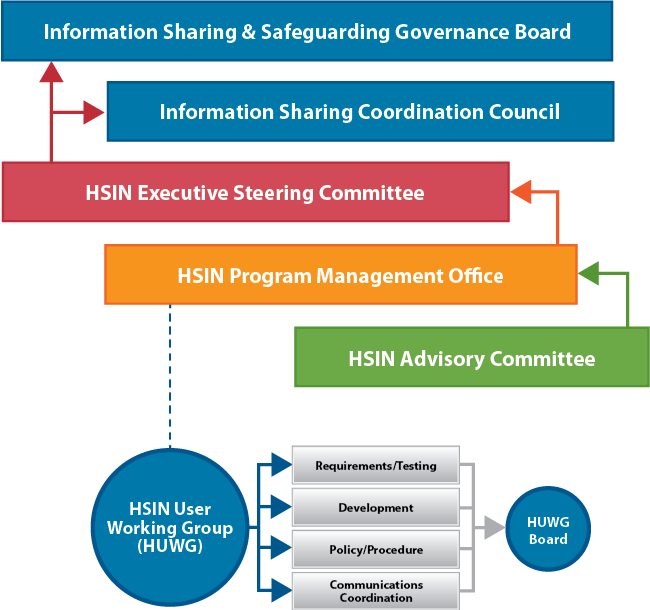Governance
HSIN User Working Group
Best Practices Community of Excellence
The Best Practices CoE was created to enable HSIN users to focus on their homeland security mission, fostering ideas to create solutions that utilize HSIN and build knowledge and experience with the confidence and support of the HSIN Program Management Office. Comprised of HSIN users who share their knowledge and best practices, the CoE delivers innovative ideas and continuous improvement as it relates to the use of HSIN. Best Practice sessions are held monthly, offering prime examples of HSIN's real world success stories to promote the use of best practices and to support stakeholders across HSIN communities from major event planning, maximizing use of HSIN tools and capabilities, to training.
As a user-driven program, the HSIN User Working Group (HUWG) continues to be HSIN's primary governance body for the capture and oversight of user feedback. The HUWG and its subcommittees open dialogue with HSIN users, giving them the opportunity to share their unique experiences and insight with both the program and each other. HSIN users have a role in the development and validation of the requirements that drive HSIN, testing of new capabilities, development of new policies and procedures, and the recommendation and validation of messaging strategies and communication products.
In FY 2016, the HUWG Requirements and Testing subcommittee brought together key stakeholders to provide the program feedback on a key area of improvement, HSIN Exchange, the program's RFI tool. The HSIN Exchange sessions consisted of analysts and other fusion center personnel from across the country, as well as representatives from the TSC, Cyber Intelligence Network and the office of the Program Manager for the Information Sharing Environment, to provide the program direct feedback on how HSIN could provide an easy and transparent way to track and accurately report on RFIs managed by each fusion center individually and by the National Network of Fusion Centers as a whole. The HUWG Requirements and Testing subcommittee also met several times throughout FY 2016 to gather and validate users' functional requirements for two other major customer engagements, the Criminal Intelligence Enterprise Community and the NPPD NCCIC portal migration. Through sessions like these, HSIN is able to reach out to users and gather operational feedback to make daily operations more efficient and effective.
HSIN Advisory Committee
The HSIN Advisory Committee (HSINAC) is a discretionary advisory committee that provides advice and recommendations to the Secretary of Homeland Security on matters relating to HSIN. These matters include system requirements, operating policies, community organization, knowledge management, interoperability and federation with other systems, and any other aspect of HSIN that supports the operations of DHS and all its mission partners. The HSINAC held two meetings in FY 2016, a virtual session and an in-person meeting, at which time recommendations were developed and submitted to the Secretary. The members provided recommendations to the Secretary focusing on the near and long-term outlook for the HSIN Program, including program priority support when it migrates to the cloud environment, developing tools and features to increase information sharing effectiveness, and reinforcing HSIN as the target platform for information sharing by directing SBU information-sharing platforms within DHS and its components to consolidate on HSIN or to pursue single sign-on capabilities with HSIN.
HSINAC members are critical to HSIN's continued success as they are able to provide fresh, mission-specific guidance and ideas to the program that assist in the advancement of information sharing across the homeland security enterprise.
HSIN Executive Steering Committee
The mission of the Executive Steering Committee (ESC) is to provide effective governance, oversight and guidance to the HSIN Program Management Office to ensure that users' mission critical requirements are met accurately, on time and on budget. The ESC has a strong relationship with the Information Sharing and Safeguarding Governance Board (ISSGB). The ESC provides analytical support and makes recommendations to the ISSGB, and defers to the ISSGB or its leadership on information sharing policy and portfolio management issues.



 Commander Ted Fries
Commander Ted Fries Jessica Garcia
Jessica Garcia Peter Hoffman
Peter Hoffman Sgt. Anthony Jones
Sgt. Anthony Jones  Brian Quinn
Brian Quinn Caitlin Durkovich
Caitlin Durkovich Greg Hayes
Greg Hayes Sarah Edie
Sarah Edie Mike Sena
Mike Sena Command Intelligence Officer Lt. Scott Branner
Command Intelligence Officer Lt. Scott Branner C.J. Noelck
C.J. Noelck Lieutenant Tim Burkett
Lieutenant Tim Burkett